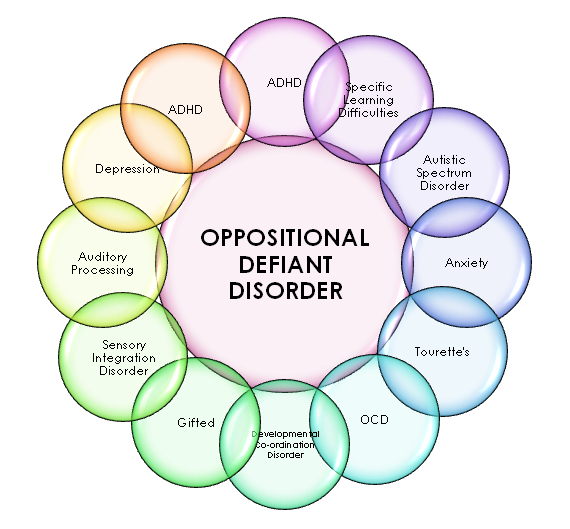Oppositional Defiant Disorder

Many neurodevelopmental conditions can often exist together, but each can be treated in different ways. The picture below illustrates how the conditions overlap. Please use the drop down menu to view other conditions.
What Is Oppositional Defiant Disorder (ODD) ?
What Are The Symptoms Of ODD ?
Symptoms may include;
- · Frequent temper tantrums
- · Excessive arguments with adults
- · Refusal to comply with adult requests
- · Always questioning rules; refusal to follow rules
- · Behaviour intended to annoy or upset others
- · Blaming others for his/her behaviours or mistakes
- · It is never their fault!
- · Easily annoyed by others
- · Frequently has an angry attitude
- · Speaking harshly or unkindly
- · Seeking revenge
It is often very difficult to tease out the extent of ODD symptoms in relations to possible autistic spectrum difficulties and even emotional volatility or bipolar disorder with mood instability. This warrants very careful assessment and sometimes these conditions may coexist together.
What Causes ODD ?
Only about 10% of cases are ODD alone. The high prevalence of associated ADHD has led some authors to consider that there should be a form of ADHD diagnosed as the oppositional form of ADHD. Almost certainly the early onset form is not due to environmental influences alone but it does cause difficulties and significant family dysfunction.
How Common Is ODD ?
How Is ODD Diagnosed ?
What Is The Treatment For ODD ?
- Parenting strategies must be looked at carefully. The key principles for parenting a child with ODD are on the LANC behaviour modification handout/link.
- Medication may have a very important role in the management of children with particularly the early onset of oppositional defiant disorder. Frequently when the underlying ADHD is treated the oppositionality improves. However if this is not the case an experienced clinician may sometimes need to consider adding either Clonidine or Risperidone to help mellow the oppositional symptoms.



